BY SYLVIE ROBINSON ’27
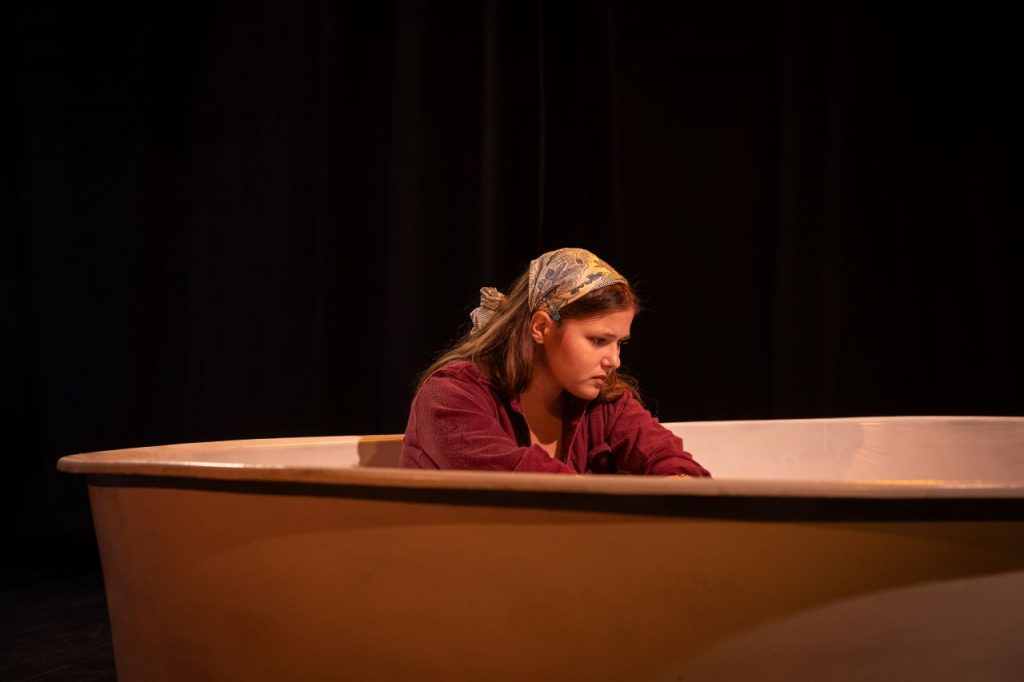
Filing into your seats, eager to see the show, and there she is. Crouching inside a bathtub center stage and fiercely staring at the drain pipe, sits Mae, convinced she can hear the sound of water flooding back. The warm lights buzz in synchronicity with the excited audience.
On September 29th and 30th, the audiences in studio A patiently waited for a nuanced, tender, and heart-rending queer love story, situated within desperate and dark rural Georgia. Set in the unfortunate near future, Edie (Jordan Azzinaro ‘26) and Mae (Logan Waugh ‘24) live in a world plagued by drought. Directed by Lillie Shelor ‘25, Edie and Mae by Jacqueline Goldfinger is a 30-minute one-act that tackles the complexities of love, salvation, and hope in times of immense crisis. Confined to one bathroom, this deeply moving play follows Edie and Mae’s relationship in the context of the doomed world around them and ultimately leaves the audience questioning the reality they were presented with. Mae, the dreamer, and Edie, the realist, ask the audience through their battles with yearning and devotion: what is the cost of the maintenance of hope in times of despair?
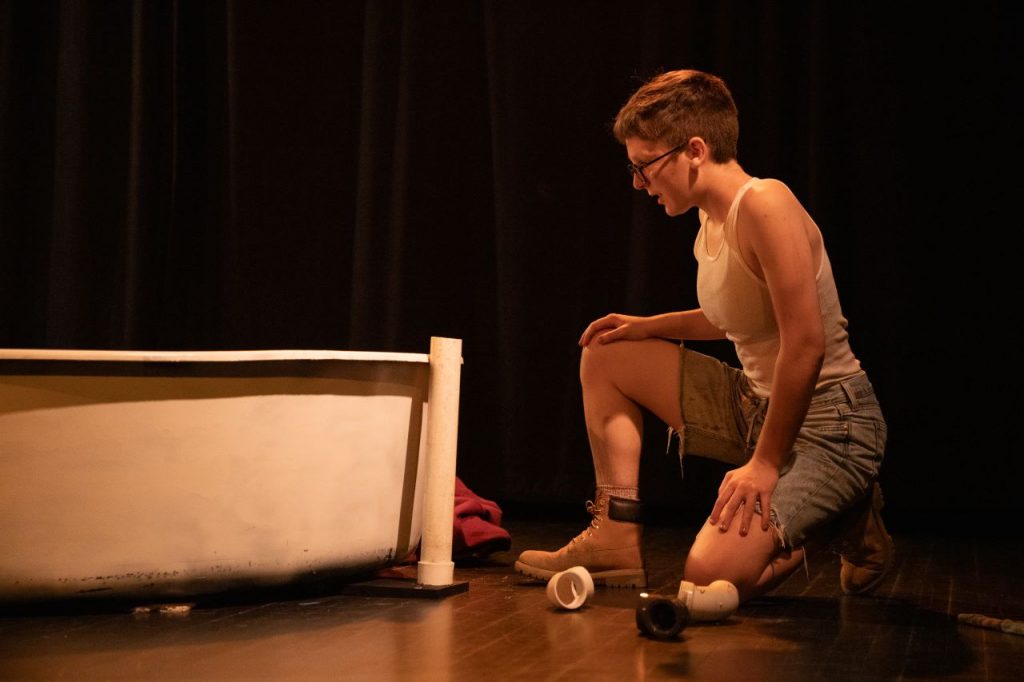
The play begins with Edie throwing pipes onto the stage through a wooden windowsill upstage. Stepping through, she slaps her arm and peels off a dead bug underneath her hand to eat it. Scattered on the floor are various-sized pipes, tools, tape, and a record player that skips annoyingly. Both Edie’s new presence in the room and the incessant skipping are entirely ignored by Mae, who presses her ear against the drain pipe, maintaining a sharp focus. Edie then attempts to screw the pipes into the tub while complaining about the noise and vying for Mae’s attention. Ignored, frustrated, and failing to make the pipes fit, Edie storms over to the record player and beats it senseless with a pipe.
The abrupt stop of the music causes the two to engage in what would be the first of many arguments that repeat throughout the show, centered around the validity of Mae’s conviction that water is returning to them. In a futile attempt to get Mae to eat, Edie offers a bug from her pocket with an imploring smile but Mae vehemently refuses. The lighting changes and a desolate hum fills the room, representing Mae’s visions about the water as her focus returns to the tub, dignified and validated. The change in light and sound reappears continually throughout the play but is typically unseen and unheard by Edie. Suddenly, the two components abruptly stop and Edie holds her hand out with a dead bug in her palm, pleading zealously once again for Mae to eat, but to no avail. However, Edie does not concede with grace and instead eats the bug while passive-aggressively licking her fingers. Having been put over the edge, Mae yells and criticizes Edie for her pessimistic point of view. As an attempt to deflect against Edie’s confidence about the water not returning, the argument evolves into one about Edie’s failure to fix the pipes. Edie, feeling hurt, takes the caulk gun off her belt loop, drops it to the floor, and walks to the window to leave.
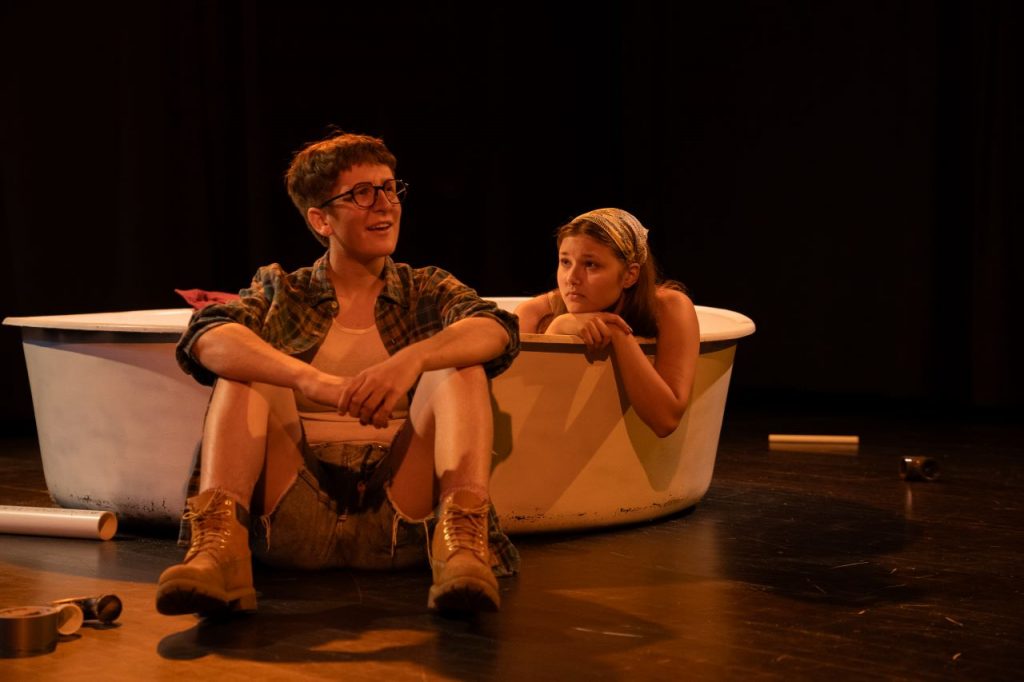
In an attempt to reconcile and stop Edie from leaving the room, Mae begins to discuss her memory of water, using language that is rich and descriptions that are luminous; actor Logan Waugh grasps the audience’s attention with a passionate delivery. Taking the story into her own hands, Edie recounts the fond memory of the first time she met Mae’s father over buckets of blueberries – a fruit that requires a wealth of water – which ultimately led her to meet Mae. After discussing what would be the last blueberries she saw with Mae’s father and the memory of running water, she retells the story of how she first laid eyes on Mae. Besides trying to get Mae to eat, Edie’s reminiscing of the past serves as the audience’s first glimpse into the depth of Edie’s love for her. In describing the image of Mae running her hands under water, Edie reveals the sheer importance of water at the time of the memory as a resource that people were willing to kill for. Edie ends the conversation with a recollection of the moment she knew they “was never gonna stop being in love,” as Mae paradoxically rinses her hands under a faucet and wastes what little water was left. Excellently staged by Lillie Shelor and fervently executed by Jordan Azzinario, each of their words and steps pulls the audience into the couple’s history and love.
Edie is presented with a taxing burden: finding a way to let Mae continue to hold out hope – fixing the pipes for her – and not submitting to Mae’s delusions so that Mae ends up starving herself. Unable to see that Edie’s actions are motivated by intense and limitless love, Mae continually reminds Edie of her inadequacies, stirring the pot of their relationship.
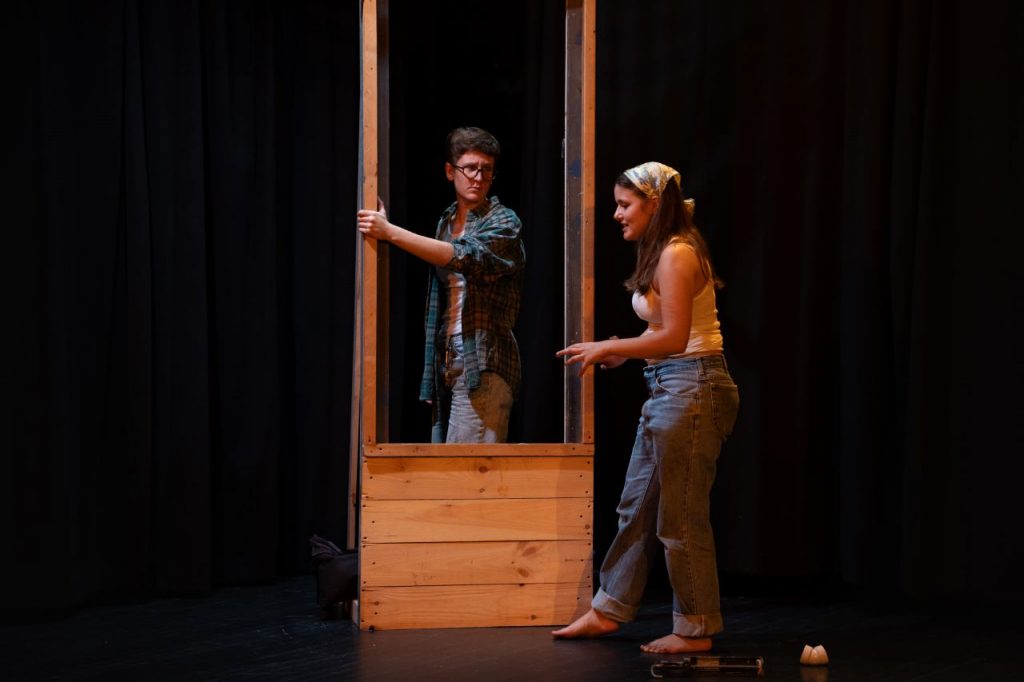
Cutting right through this emotionally intimate moment, Mae then again yells at Edie to fix the pipes. Edie redirects the conversation back onto the bugs in her hand, pleads to Mae to eat them, and makes a failed attempt to force them into Mae’s mouth. Refusing and ripping them from Edie’s hand, Mae throws them out the window, proclaiming that she will only eat what grows when the water comes back. The bugs being the last she had, Edie is pushed past her tipping point. The hot tension in the air (beautifully crafted by Logan and Jordan) is suspended as Edie picks up a large pipe, is about to hit Mae with it, then drops it to the ground and leaves. Mae hears something from the tub but soon after the sound stops, prompting her to exit.
The next scene starts with Edie alone onstage, finally making the pipes fit. Upon her victory, she calls and calls for Mae, who eventually enters with a carton of blueberries in hand. We, the audience, can see them; however, Edie cannot. Mae declares that the blueberries are back saying, “Blueberries and showers. Water for all, “ and offers one to Edie, who attempts to gently tell her that there’s nothing in between her fingers but soon realizes it’s pointless, pretending to eat one. For the first time, Edie gives into Mae’s delusions and soon after asks Mae if she’s happy. When she affirms that she is, Edie relaxes and lovingly looks upon a joyful Mae, who then tells the story of how her parents fell in love over a well and a cracked bucket. After a stunningly performed monologue, she brings up the blueberries, asking if they look how they used to. Edie replies yes but then makes an effort to get Mae to eat, telling her, “You’re gonna go crazy, Mae, or starve. One? A body needs water. Please.” Mae (again, shocker) declines, throwing the bug offstage, and Edie finally accepts the refusal saying, “Okay, Mae, okay.” The two share a tender kiss and exit, hand in hand.
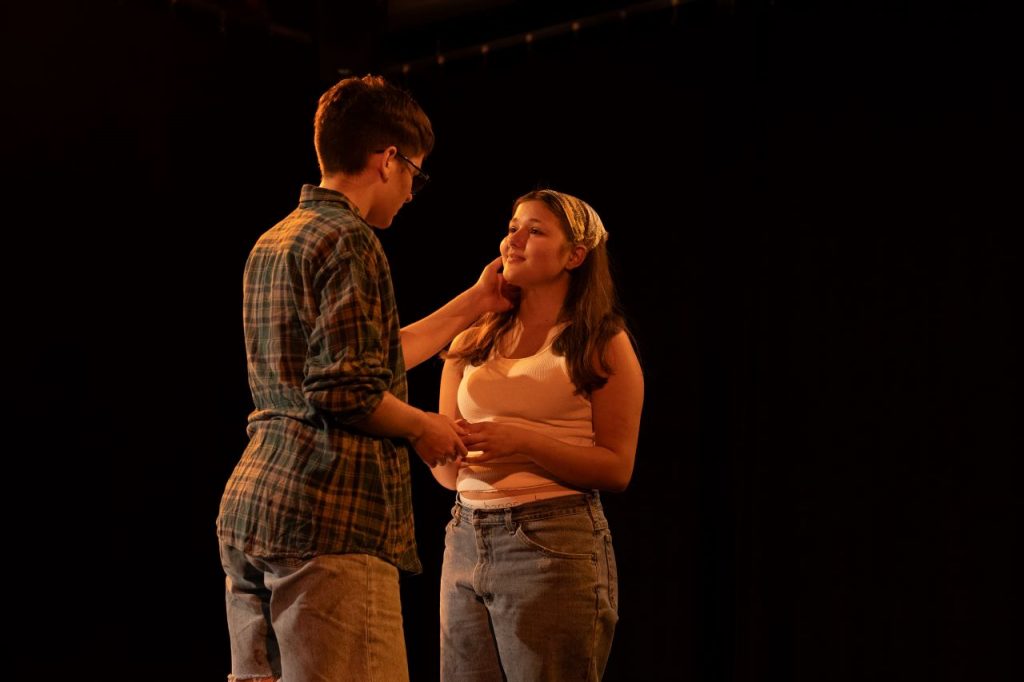
The last scene of the play starts with Mae tossing pipes through the window, parallelling the first scene. She’s exhausted, dragging her feet and stumbling as she picks up the pipes and walks to the tub, successfully attaching them. She repeats Edie’s dialogue as well as her own from previous scenes, clearly in a delirious state. She then rediscovers the pipes she just fit together and the lights turn ominously blue and the sound of running water intensifies. She exclaims, “I hear it! I hear it coming, Edie! The water is coming, Edie! The water is finally here!” Head tilted towards the sky, she extends her arms out, as if under a large rain cloud.
The intense ending leaves an exceptional amount for the audience to decipher. Was Edie ever real? What happened to her if she was? Did the water return? Was Mae right? Dark, intimate, loving, and funny, this show leaves the audience scrambling for more, hanging on tightly to this short masterpiece. The visual world – delicately contrived by lighting designer Maddie Evans and set designer Ida Mihok – and Jacqueline Goldfinger’s words – excellently executed by Jordan Azzinaro and Logan Waugh and directed by Lillie Shelor – makes this bleak and desperate world come alive. Tacking the balance of love and ethics, Edie and Mae takes us on a darkly comical, touching, and raw journey through a world in crisis. Their desperation for hope and survival ultimately forces us to look at today’s water and climate crisis in the face. Edie and Mae asks us: when will you last see “Blueberries and showers? Water for all”?
Photos by Coltrane Cho ‘24
***
Sylvie Robinson ’27 is a staff writer for the Skidmore Theater Living Newsletter
